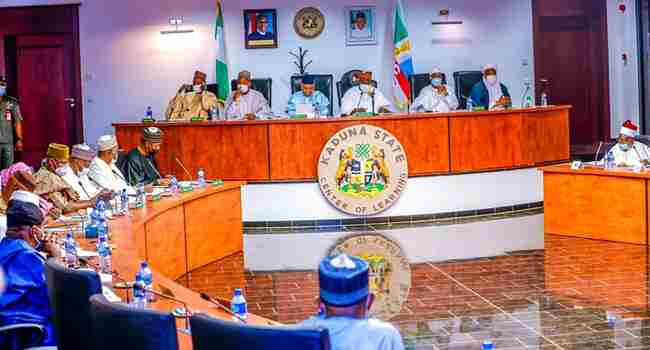The recent response from the Northern Governors Forum, led by Gombe State Governor Mohammed Yahaya, opposing a proposed derivation-based Value Added Tax (VAT) sharing formula is not only laughable but reveals their unwillingness to engage in meaningful economic discourse.

According to the proposed policy, states hosting more multinational companies would receive a larger share of VAT than those with fewer businesses. Instead of Northern governors delving into why the region has slid from an economic leader to its current state over the past 62 years, they’ve chosen to prioritize the immediate financial impact of VAT.
In 1962, the Northern region exported more groundnut products than crude oil, serving as Nigeria’s economic heart. The groundnut pyramids were not only Nigeria’s pride but a symbol of economic success across Africa.
Sadly, persistent neglect by leaders, who have prioritized religious extremism over economic productivity or improving school enrollment, has turned the region into an enclave for terrorism.
Had the Northern governors responded to issues like insecurity and out-of-school children with the same urgency as they did with VAT distribution, the region might have thrived.
Rather than focusing on VAT shares, they should be more concerned with the alarming rate of out-of-school children in the region.
In 2023, for example, the United Nations Children’s Fund (UNICEF) reported that Northern Nigeria accounts for 15.23 million out of the nation’s 17.81 million out-of-school children. Northwest Nigeria had 8.04 million; the Northeast had 5.06 million, while North Central accounted for 2.12 million.
To put this in perspective, the population of out-of-school children in the North exceeds the populations of countries like Belgium (11.6 million), and the United Arab Emirates (9.5 million). This crisis should be causing sleepless nights for the governors; however, the VAT formula seems to be their primary concern.
Even more troubling is the failure to recognize that extreme poverty fuels youth restlessness and exacerbates insecurity. Out-of-school children become easy targets for terrorist recruitment.
In their regions, terrorists have carved out territories to conduct criminal activities. These groups now collect taxes from local farmers to clear, plant, and harvest farmland. They destroy power infrastructure and have the audacity to disrupt repair efforts.
Terrorist attacks on power facilities have left over 90% of the region in darkness for nearly two weeks. Power Minister Adebayo Adelabu’s recent statement that “bandits are threatening the contractors we send to fix it” highlights the severity of Northern insecurity and undermines claims that terrorism has been “decimated.”
The insecurity is so pervasive that many Northern governors now prefer to reside in the Federal Capital Territory (FCT), only visiting remote, underserved areas during election campaigns, accompanied by heavy security.
Moreover, religious extremism prevents these states from fully leveraging their population strength.
For instance, despite Sharia laws prohibiting alcohol sales, they still receive VAT revenue generated from alcohol sales in the Southern states. Even worse, some states actively destroy alcohol-related businesses, stifling wealth creation and scaring off investors.
In Kano, the Hisbah Board has destroyed over 10 million bottles of beer since the campaign against alcoholic drinks began in the state, representing billions in market value. Such rigid beliefs and high insecurity levels deter investment, explaining why many Northern states struggled to attract investors in 2022 and 2023.
The Northern governors need to focus on restoring security, reducing the number of out-of-school children, and improving infrastructure to connect the region through rail.
The North has no reason to complain about revenue—some nations thrive on a fraction of the resources they possess. It’s time for the governors to stop complaining about water while surrounded by the sea.


